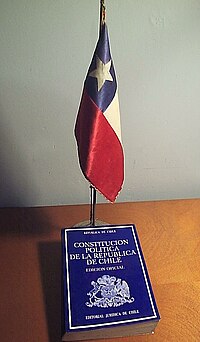Action of Rights Protection (Chile)
This disposition provides that: El que por causa de actos u omisiones arbitrarios o ilegales sufra privación, perturbación o amenaza en el legítimo ejercicio de los derechos y garantías establecidos en el artículo 19, números 1º, 2º, 3º inciso cuarto, 4º, 5º, 6º, 9º inciso final, 11º, 12º, 13º, 15º, 16º en lo relativo a la libertad de trabajo y al derecho a su libre elección y libre contratación, y a lo establecido en el inciso cuarto, 19º, 21º, 22º, 23º, 24 °, y 25º podrá recurrir por sí o por cualquiera a su nombre, a la Corte de Apelaciones respectiva, la que adoptará de inmediato las providencias que juzgue necesarias para restablecer el imperio del Derecho y asegurar la debida protección del afectado, sin perjuicio de los demás derechos que pueda hacer valer ante la autoridad o los tribunales correspondientes.
"The one that due to arbitrary or illegal acts or omissions suffers deprivation, disturbance or threat in the legitimate exercise of the rights and guarantees established in article 19, numbers 1, 2nd, 3rd fourth paragraph, 4th, 5th, 6th, 9th final paragraph, 11th, 12th, 13th, 15th, 16th in relation to freedom of work and the right to its free choice and free contracting, and to the provisions of subsection fourth, 19th, 21st, 22º, 23rd, 24th and 25th, may resort to anyone in their name, to the respective Court of Appeals, which will immediately adopt the provisions that you judge necessary to restore the empire of the law and ensure the proper protection of the affected, without prejudice to the other rights that it may enforce the corresponding authority or courts.
20 above and the Judicial Decree (Autoacordado) about processing of the Trial for the Protection of Constitutional Rights, issued by the Supreme Court in 1992 (modified in 2015 and 2018).
In practice all these possibilities have been given; The only great limitation would be represented by the fact that "no one can claim a right generically, for simple love to it, but has to suffer impairment or a threat some specific person".
[8] Passive standing of Rights Protection Action falls on the author of the illegal or arbitrary fact or omission that violated a constitutional guarantee.
It is commonly estimated that the illegal represents a formal contravention of legal and arbitrary text an absence of rational foundation, that is, a manifestation of the simple whim of agents.
Within the legal doctrine of Superior Courts of Chilean Justice, it has been indicated in this regard that "a fact is illegal when the regulations that must be governed or when an organ exercises exclusive powers in an improper way is not attended, contrary to the law,".
Disturbing "it's equivalent to upset order and concert of things to their stillness and calm" and finally, threat must lead to imminent danger, bad future, that is, it must be "serious and not illusory, current, precise and not vague and concrete in its results.
19 (indicated numerals): The Rights Protection Action will be filed before the Court of Appeal in whose jurisdiction the arbitrary or illegal fact or omission was incurred that causes deprivation, disturbance or threat in the legitimate exercise of the respective constitutional guarantees.
that may have produced deprivation, disturbance or threat to free exercise of rights that are requested to be protected, setting a short and peremptory period to issue the report, noting that together with this, the obliged to evacuate it will send to the Court all antecedents in its power on the subject matter of the action.
The Court, when it deems it appropriate for purposes of the action, may decree an order for not innovating (orden de no innovar), that are measures aimed at preserving the factual or legal situation presented at the time of admission of the claim, in relation to people and assets included in the process.
[14] Court will evaluate in accordance with the rules of sound criticism (sana crítica) the background information that accompanies the action and others that are added during the trial.
Now, the Supreme Court, in order to hear the appeal or for the best judgment of the ruling, may request from any authority or person the background information it considers necessary for its resolution.
24 CPR) of the appellant; Consequently, the agreement adopted by the respondent was declared illegal, it was ordered to annul said increase and to continue charging a value that did not exceed the maximum percentage determined by the transportation authority of the price of an adult passenger..
For the majority of the Chilean doctrine, along Eduardo Soto Kloss thesis, to determine effects of res judicata in the protection action, attention must be paid to the favorable or unfavorable result of the sentence.

